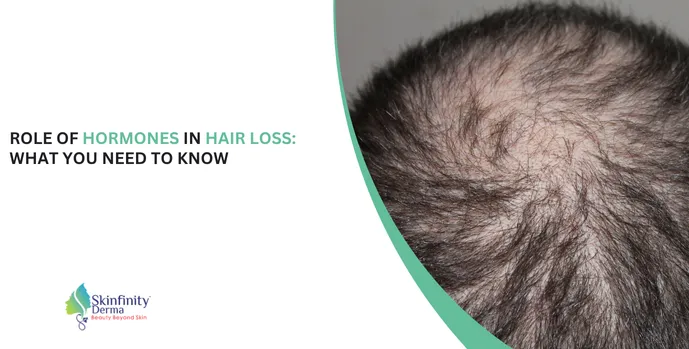
Medically Reviewed by: Dr. Ipshita Johri
MBBS, DDV | Skinfinity Derma Clinic
Read Time: 8 Minutes
Hair loss is more common than most people realize. For many men and women, it’s not only about aging or genetics. Hormones play a significant role too. When these natural body chemicals fall out of balance, they can quietly affect how your hair grows, rests, and sheds. The good news is that hormonal hair loss can be managed. With proper medical care, it’s possible to restore balance and help your hair regain its strength and volume.
How Hormones Affect Hair Growth
Every strand of your hair goes through a natural growth cycle: growth (anagen), rest (telogen), and shedding (catagen). Hormones act like messengers that tell your hair follicles when to grow and when to pause. When these hormones are balanced, your hair grows in a healthy, steady rhythm. But when they fluctuate or rise abnormally, the hair cycle can get disrupted. As a result, you may notice thinning, slower growth, or even patches of hair loss. These changes are your body’s way of signaling that something deeper, often hormonal, is happening.
Common Hormones Linked to Hair Loss
Here are common hormones that are linked with hair loss in the majority of cases.
1. Dihydrotestosterone (DHT)
DHT is one of the most common hormonal causes of hair loss. It is formed when testosterone converts into a stronger androgen. In sensitive individuals, DHT attaches to hair follicles and makes them shrink over time. The hair becomes finer, shorter, and eventually stops growing. This pattern is often seen in male and female pattern hair loss.
2. Estrogen and Progesterone
These hormones help keep hair thick and healthy. When estrogen and progesterone levels drop, such as after pregnancy or during menopause, the hair’s growth phase shortens. That’s why many women notice increased hair shedding during these life stages.
3. Thyroid Hormones
Both an overactive and underactive thyroid can cause diffuse hair thinning. Thyroid hormones control your body’s metabolism, and when they fluctuate, the scalp may not receive enough nutrients for steady hair growth.
4. Cortisol (Stress Hormone)
Chronic stress increases cortisol levels, which can push hair follicles into a resting phase. Over time, this can lead to noticeable shedding, known as telogen effluvium. Stress-related hair loss usually improves once hormone levels return to normal.
Hormonal Hair Loss in Men
Men often experience androgenetic alopecia, commonly called male pattern baldness. It usually starts with a receding hairline or thinning at the crown. The main trigger is the sensitivity of hair follicles to DHT. Even though genetics play a role, hormonal balance and early medical care can slow or even reverse the process. Treatments like minoxidil, low-level laser therapy, or PRP (platelet-rich plasma) can stimulate regrowth and strengthen existing hair.
Hormonal Hair Loss in Women
Women experience hormonal hair loss differently. Instead of bald patches, there’s usually gradual thinning or widening along the part line. Conditions like PCOS (Polycystic Ovary Syndrome) increase androgen levels, which can cause scalp hair thinning and unwanted facial hair growth. Hormonal shifts after childbirth or menopause can also cause sudden shedding. Because women’s hormone cycles are complex, it’s important to have a proper evaluation before starting any treatment.
Signs That Your Hair Loss May Be Hormonal
You may suspect a hormonal cause if:
-
Hair feels thinner or weaker than before
-
You notice increased hair shedding after pregnancy or during menopause
-
Hair loss is accompanied by acne, irregular periods, or fatigue
-
Hairline recession or widening of the central part becomes noticeable
If any of these changes sound familiar, a dermatologist can help identify the exact cause and guide you toward the right care plan.
Diagnosis: Identifying the Root Cause
At Skinfinity Derma Clinic, our dermatologists take a detailed approach to diagnose hormonal hair loss. We begin with a personal consultation to understand your symptoms, medical history, and lifestyle factors. Then, we may recommend blood tests to check your thyroid function, estrogen, testosterone, or other hormone levels.
A scalp examination helps us understand the pattern and extent of hair loss. These steps together reveal whether the cause is hormonal or linked to another condition such as nutritional deficiency or stress. This clear diagnosis ensures that you receive safe, effective, and personalized care instead of temporary fixes or over-the-counter products that may not address the root cause.
Treatment Options for Hormonal Hair Loss
These are top options for hair loss treatment that help in hormonal control.
1. Medical Treatments
Depending on the cause, treatments may include:
-
Minoxidil: Improves blood flow to hair follicles and stimulates regrowth.
-
Anti-androgen medications: Help block the effects of DHT in men and women.
-
Hormone correction: Managing thyroid disorders or PCOS can gradually improve hair density.
Every treatment is prescribed carefully after evaluating your health, hormones, and scalp condition.
2. Lifestyle and Nutrition
Small daily changes can support long-term hair health. Eating a diet rich in protein, vitamins, and iron helps nourish follicles. Managing stress through yoga, meditation, or gentle exercise can lower cortisol levels. Getting enough sleep also keeps hormones balanced naturally.
3. Advanced Clinical Treatments
At Skinfinity Derma Clinic, we offer advanced procedures that work at the root level:
-
PRP Therapy: Uses your own platelet-rich plasma to stimulate natural hair growth.
-
Growth Factor Concentrate Therapy: Delivers concentrated proteins to strengthen hair follicles.
-
Microneedling with Serums: Improves scalp absorption and boosts new hair formation.
Each treatment is performed under expert care, ensuring comfort, safety, and visible improvement over time.
Long-Term Hair Health Tips
To maintain results and protect your scalp:
-
Avoid tight hairstyles and frequent chemical treatments.
-
Use mild, dermatologist-recommended shampoos.
-
Protect your scalp from excessive sun exposure.
-
Schedule regular scalp checkups for preventive care.
Consistency and patience are key to seeing lasting improvement.
When to Consult a Dermatologist
It’s time to seek medical help if:
-
Hair loss is sudden or severe.
-
You see visible scalp patches or increased hairline recession.
-
Hair loss is affecting your confidence or emotional well-being.
-
You have symptoms like fatigue, irregular cycles, or unexplained weight changes.
At Skinfinity Derma Clinic, our specialists provide caring guidance and evidence-based treatments to restore not just your hair but also your confidence.
Conclusion:
Hormones are an essential part of your body’s natural rhythm. When they fluctuate, your hair can be one of the first places to show it. But with the right diagnosis and care, hormonal hair loss can be treated safely and effectively.
At Skinfinity Derma Clinic, we focus on understanding your body’s signals, addressing the underlying imbalance, and supporting you throughout your recovery journey. Healthy, confident hair begins with hormonal balance and professional care that truly understands your needs.


